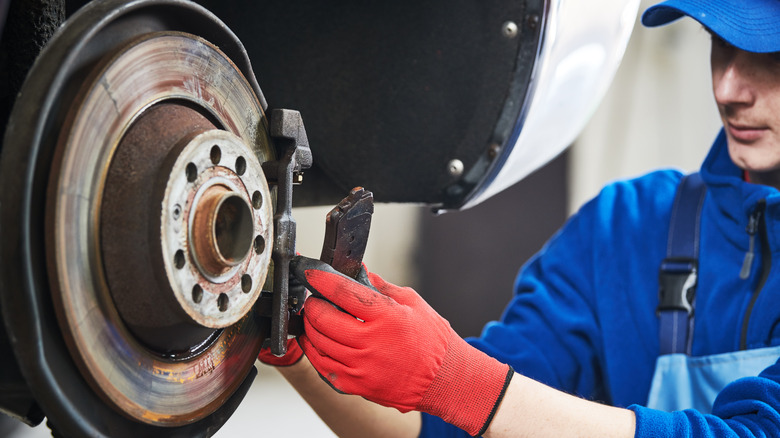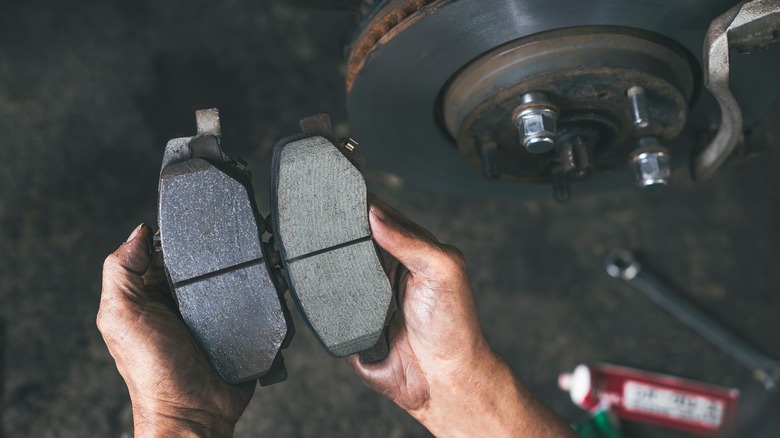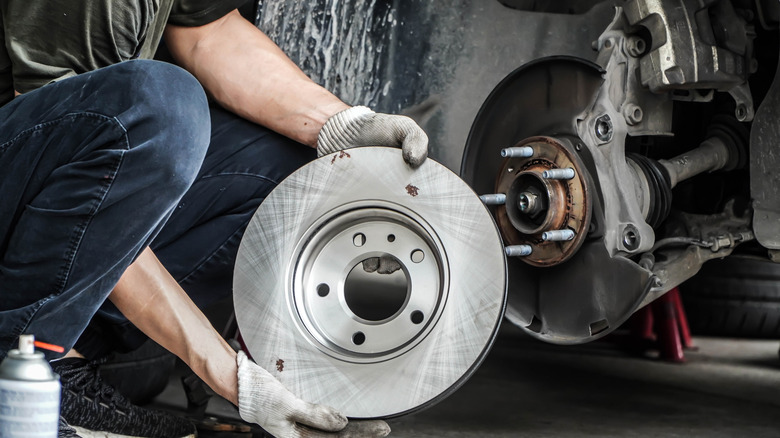How Much You Should Actually Be Paying To Get The Brakes Fixed On Your Car
Upon hearing the irritating squeaking sounds coming from your car every time you press the brake pedal, you know that it's about time for brake pad replacement. Common sense says you shouldn't neglect your car's brakes, but filling up a mechanic's pockets with your hard earned money doesn't sound appealing either. There's always the option of changing brake pads at home, but even if you know how to do so, it's dirty and time-consuming. A mechanic shop might try to sway you into paying for an oil change or other regular maintenance services, or even worse; you might run into a snake oil salesperson.
Building trust with a mechanic shop is crucial, as they'll be the ones to tell you if certain parts of your car need to be replaced. But building trust takes time, and right now, it's time for you to arm yourself with the knowledge of how much you should actually be paying for brake replacement so that you can keep your mechanic honest.
Costs are determined by the make and model
The price for brake pad replacement is determined mainly by the make and model of your car, as well as your location, to an extent. Nerd Wallet claims that replacing a set of brakes will cost anywhere from $115 to $270. That's for either the front or the back, so replacing brake pads on all four wheels would cost between $230 to $540.
There's also the question of performance, which is decided based on the three types of brake pads you should know about. Brakes are one of your vehicle's most important safety features, so you shouldn't cheap out, but unless you're preparing for a race track, regular organic brake pads should do just fine. Your other options are ceramic and metallic brake pads, which offer better performance for a higher price. These types of brakes are designed for high-performance cars, so unless you own a sports car or drive like the road is your dedicated race track, you won't notice a difference between organic, ceramic, and metallic brake pads.
Brake pads are estimated to last between 20,000 and 70,000 miles. For safety and durability, organic brake pads that are premium quality hit the spot just right, and paying a few dollars extra instead of buying economy quality will keep you safer and save you money long term. Other factors that determine the brake pad lifespan are your driving habits and road conditions, as well as the conditions of your rotors and calipers.
Brake pad, brake rotor, and brake caliper replacement
If your mechanic suddenly recommends new brake rotors, or even calipers, you might want to hear them out. Rotors are what brake pads clamp onto to slow down a vehicle, while calipers hold the pads in place and squeeze them to apply pressure onto the rotors. Needless to say, both are just as crucial as pads.
As a rule of thumb, brake rotors should be replaced every other time brake pads are replaced. However, some shops recommend replacing them every time you replace brake pads because of uneven wear on the rotors caused by the pads; both are correct depending on the quality of the rotors. Repair Pal claims that the average cost of brake rotor replacement ranges from $271 to $367. Brake calipers are estimated to last 100,000 miles, but that expected lifespan decreases in areas where road salt is used excessively. Mechanics typically notice whether they need replacement during an inspection, often while they're replacing the pads. Brake caliper replacement is no joke, as it could run you anywhere from $523 to $829, Repair Pal claims.
That's why it's important to find a trustworthy mechanic with whom you can build a long-term relationship. They will be the ones to let you know whether or not your brake rotors or calipers need replacement along with brake pads, or if you could save some money now and replace them on your next spin to the shop.


